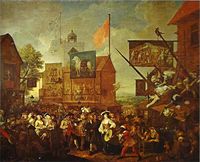Annotation:London is a Fine Town: Difference between revisions
(Created page with "'''Back to [[{{BASEPAGENAME}}]]''' ---- <p><font face="garamond, serif" size="4"> '''(OH) LONDON IS A FINE TOWN.''' AKA and see "Watton Town's End," "[[Bonny Peggy Ramsey]...") |
No edit summary |
||
| Line 1: | Line 1: | ||
'''Back to [[{{BASEPAGENAME}}]]''' | =='''Back to [[{{BASEPAGENAME}}]]'''== | ||
---- | ---- | ||
<p><font face="garamond, serif" size="4"> | <p><font face="garamond, serif" size="4"> | ||
'''(OH) LONDON IS A FINE TOWN.''' AKA and see "[[Watton Town's End]]," "[[Bonny Peggy Ramsey]]," "[[Our Polly is a Sad Slut]]." English, Air and Country Dance Tune (4/4 or 2/2 time). E Major (Chappell): F Major (Sharp). Standard tuning (fiddle). One part. This air appears in Henry Playford's '''Dancing Master''' (1665 and later editions), D'Urfey's '''Pills to Purge Melancholy''' (1707), and Gay's '''Beggar's Opera''' (1728), under various titles. The melody is somewhat older, as it is referenced as the accompanying tune for another song written on the occasion of James I.'s visit to Cambridge in 1614. Kidson (1922) confirms it was "an early and very popular air, set to a merry song." Other titles of songs to the air are "The Gowlin," a "Scotch" song from D'Urfey's play '''Trick for Treat''', in '''Pills to Purge Melancholy''' (vol. V, 1719), "Bonny Peggy Ramsey" in '''The Dancing Master''' (1707 & 1719), "The Cuckowes Comendation" ('''Pepys Collection'''), and "Our Polly is a sad slut" in Gay's '''Beggar's Opera''' (1728). | '''(OH) LONDON IS A FINE TOWN.''' AKA and see "[[Watton Town's End]]," "[[Bonny Peggy Ramsey]]," "[[Our Polly is a Sad Slut]]." English, Air and Country Dance Tune (4/4 or 2/2 time). E Major (Chappell): F Major (Sharp). Standard tuning (fiddle). One part. This air appears in Henry Playford's '''Dancing Master''' (1665 and later editions), D'Urfey's '''Pills to Purge Melancholy''' (1707), and Gay's '''Beggar's Opera''' (1728), under various titles. The melody is somewhat older, as it is referenced as the accompanying tune for another song written on the occasion of James I.'s visit to Cambridge in 1614. Kidson (1922) confirms it was "an early and very popular air, set to a merry song." Other titles of songs to the air are "The Gowlin," a "Scotch" song from D'Urfey's play '''Trick for Treat''', in '''Pills to Purge Melancholy''' (vol. V, 1719), "Bonny Peggy Ramsey" in '''The Dancing Master''' (1707 & 1719), "The Cuckowes Comendation" ('''Pepys Collection'''), and "Our Polly is a sad slut" in Gay's '''Beggar's Opera''' (1728). | ||
[[File:southwarkfair.jpg|200px|thumb|left|Southwark Fair. 1733, William Hogarth (1697-1764)]] | |||
<br> | <br> | ||
<br> | <br> | ||
| Line 22: | Line 23: | ||
<br> | <br> | ||
---- | ---- | ||
'''Back to [[{{BASEPAGENAME}}]]''' | =='''Back to [[{{BASEPAGENAME}}]]'''== | ||
Revision as of 16:25, 26 September 2014
Back to London is a Fine Town
(OH) LONDON IS A FINE TOWN. AKA and see "Watton Town's End," "Bonny Peggy Ramsey," "Our Polly is a Sad Slut." English, Air and Country Dance Tune (4/4 or 2/2 time). E Major (Chappell): F Major (Sharp). Standard tuning (fiddle). One part. This air appears in Henry Playford's Dancing Master (1665 and later editions), D'Urfey's Pills to Purge Melancholy (1707), and Gay's Beggar's Opera (1728), under various titles. The melody is somewhat older, as it is referenced as the accompanying tune for another song written on the occasion of James I.'s visit to Cambridge in 1614. Kidson (1922) confirms it was "an early and very popular air, set to a merry song." Other titles of songs to the air are "The Gowlin," a "Scotch" song from D'Urfey's play Trick for Treat, in Pills to Purge Melancholy (vol. V, 1719), "Bonny Peggy Ramsey" in The Dancing Master (1707 & 1719), "The Cuckowes Comendation" (Pepys Collection), and "Our Polly is a sad slut" in Gay's Beggar's Opera (1728).

Source for notated version:
Printed sources: Chappell (Popular Music of the Olden Time), vol. 2, 1859; pp. 6-7. Sharp (Country Dance Tunes), 1994; p. 26.
Recorded sources:
